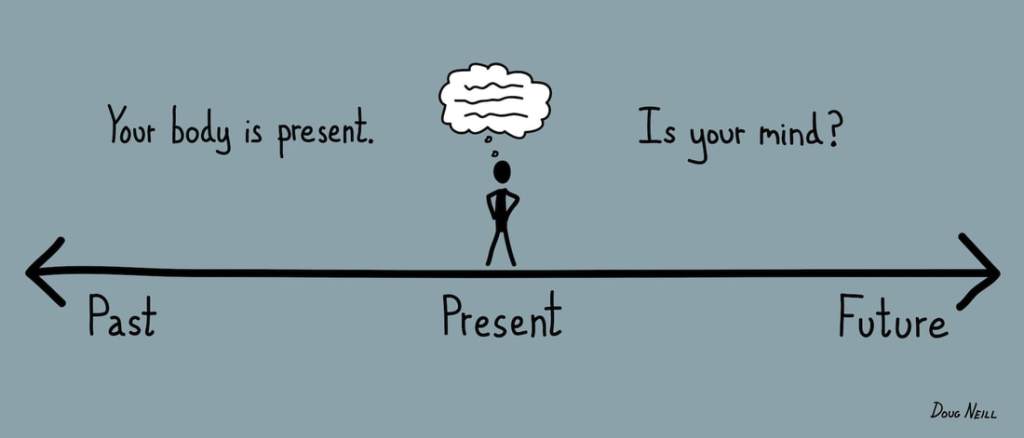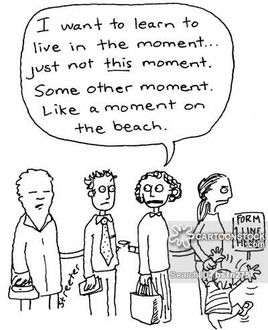Mental Health Tips
BE PRESENT, THE FUTURE ISN’T HERE YET

All we have is the present moment. Often we may let our thoughts wander to the past or future. Think about the most enjoyable moment of your life. Did this moment involve thinking or were you completely focused on an activity? Chances are, you were completely focused on the activity. Our minds are always running, sometimes without us even realizing it. So how can we truly live in the moment? To do this, we must give our normal daily activities the fullest attention.
Your past and future have no reality- your only reality is your present. As you’re walking throughout your day, notice every stop you take, every movement and your breathing. Focus completely on your activity without thinking. Do this for all your daily activities.
Fear, stress and worry come from too much focus on the future. Guilt, sadness and regret come from too much focus on the past. When you focus on the present, you free yourself from these negative emotions.
Follow these tips to help you focus on the present…
1.) To improve your performance, stop thinking about it.
If you’re in a situation that makes you anxious, like meeting a new friend or giving a speech in class, focusing on your anxiety tends to heighten it. Focus less on what’s going on in your mind and more about what’s going on in the room.
2.) To avoid worrying about the future, focus on the present.
So often, we are so trapped in our thoughts about our future or past that we forget to experience and enjoy what’s going on now. Savor and enjoy what you’re doing, listening to or feeling at the moment instead of worrying about when it will end. To worry is to think about the future or future events that may never even happen. In becoming present, the worry melts away.
3.) Be mindful, Be present, and Breathe
Being mindful, or in the moment with your senses, boosts your awareness of how to react to what’s happening in your mind. Focusing on the present gives your mind time to respond logically and thoughtfully instead of automatically and aggressively. Being mindful increases self control. So how do you create mindfulness in stressful situations? It’s easy, just breathe! There’s no better way to bring yourself into the present moment than focusing on your breathing. Feel the breath come in through your nose, feel it fill your lungs and feel it come back out your mouth. Concentrate on only the sensation of breathing to bring you back to the present.
4.) To make the most of time, lose track of it.
The point of this is to get so completely lost in a task that you lose track of time and everything around you. First, set a goal that’s challenging but doable. Not so difficult that you’re stressed, but not so easy you’re bored. Goals need to be clear so you always know your next step. It can be as simple as turning the page of a good book. Set up tasks in a way you receive immediate feedback with your successes and failures. Over time, you start to feel a sense of accomplishment over the situation and it becomes rewarding.
5.) If something is bothering you, move toward it rather than away from it.
Many times our stress and anxiety can come from trying to avoid other emotions and sensations. We end up having emotions about emotions. For instance, if a homework assignment has you stressed, we think, “I wish I wasn’t so stressed out!” Our first emotion is our stress over the assignment, our second emotion is the feeling, “I hate being stressed.” Allow yourself to accept the first emotion. Be open to the way things are without trying to change the experience (predicting that the experience is going to end up terribly bad is different and should be avoided….seeing positive coping statements in an earlier blog entry). The present moment can be only as it is. Acceptance of an unpleasant state means that you accept that certain things are beyond your control. It also doesn’t mean you have to like what’s happening. If you feel anxiety for instance, you can accept the feeling then direct you attention to something else instead. Watch your thoughts, perceptions and emotions go through your mind without getting involved. Thoughts are just thoughts. You don’t have to believe them and you don’t have to do what they say.
6.) Know that you don’t know.
Have you ever been reading a book and gotten to the end of the page only to realize that you were so lost in your thought that you have no idea what you just read? This is called mindless. The best way to avoid this is to develop the habit of always noticing new things in whatever situation you’re in. Once we think we know something, we stop paying attention to it. By getting in the habit of noticing new things, we recognize that things are actually changing constantly. It becomes an adventure in noticing and the more you notice, the more you see and the more excitement you feel.
Mindfulness isn’t a goal because goals are about the future, but you do have to set in motion to pay attention to what’s happening at the present moment. Nothing happens next. It’s not a destination. Live in the moment.

